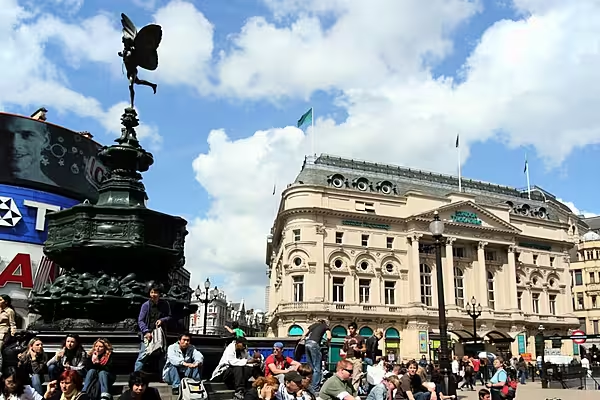As executives digest the news of the U.K.’s vote to leave the European Union, they’re cautioning that business will suffer - affecting everything from beach vacations to wristwatch ads to initial public offerings of stocks.
Companies exposed to the UK economy warned Friday that the decision could slow growth and prompt them to cut their investments in the country, and the pound and stocks plunged in response to the so-called Brexit vote.
Ryanair Holdings Plc said airfares will rise for British travellers, Swiss watchmaker H. Moser & Cie. said it’s considering reducing ad spending and people familiar with the matter said Spanish phone company Telefonica SA is considering delaying plans for IPOs of two units, including UK mobile operator O2.
For UK voters, Brexit may reflect local concerns, but the responses from corporate leaders underline the global impact of the first departure from the 28-nation bloc. The “leave” vote could lower everything from car sales to ad spending. Prior to the vote, many corporate leaders had expressed support for remaining in the EU.
‘Lose-Lose’
"This is a lose-lose result for both - Britain and Europe,” said chief executive officer Thomas Enders of Airbus Group SE, which makes wings for its aircraft in the UK. “We will review our UK investment strategy, like everybody else will."
International Consolidated Airlines Group SA, owner of British Airways, was among the first to quantify the vote’s impact, warning that the decision will reduce profit growth.
“The outcome of the referendum is disappointing,” Alcoa Inc. CEO Klaus Kleinfeld said in an e-mail. “Global integration has created security and wealth for most nations. We must all be encouraged to continue on this path and create a better future for the next generations.”
Advertising spending, which reacts quickly to economic swings, could experience a two- or three-year “roller-coaster” ride in Europe, said CEO Maurice Levy of Paris-based marketing giant Publicis Groupe SA. That could cause the company to rethink its UK investment plans, he added.
“We could have set up some centres in the UK," he said. "Now it’s out of the question. The advertising market will surely suffer.”
The UK withdrawal could cut carmaker earnings by more than 8 billion euros ($8.9 billion), reduce sales in the country by about 14 per cent and cause a 2.5 per cent decline in vehicle production in the EU in 2017, Arndt Ellinghorst, a London-based analyst for Evercore ISI, wrote in a note.
Ford, BMW
Ford Motor Co., which employs 14,000 people in the UK, said it will “take whatever action is needed to ensure that our European business remains competitive.” BMW AG of Germany, which makes Mini and Rolls-Royce cars in the UK, says the effects won’t be clear until new trade deals are negotiated. Tata Motors Ltd. of India, owner of Jaguar Land Rover, said it plans to work with the UK government to ensure the industry “remains as competitive as ever.”
The effects of the vote resounded in Asia, where the plunge in the pound lifted the currencies of Japan and South Korea. That puts pressure on car and parts makers - but could ricochet back on the UK in the form of lost investment and jobs.
Hankook Tire Worldwide Co. of South Korea will respond by "diversifying global production capability," said vice president Park Hyun Min. Japanese car-parts maker Exedy Corp. may have to consider moving its UK office to continental Europe, board member Hiroshi Toyohara said.
For UK travelers, air fares will go up and vacations will become more expensive, said Kenny Jacobs, marketing chief at low-cost carrier Ryanair. Brexit could change the dynamics of air travel, with passengers on trans-Atlantic routes possibly choosing Dublin rather than London as an entry point to Europe, he said on Bloomberg Television.
IAG, as the owner of British Airways and Iberia is known, will be worst hit among airlines, according to a note from RBC Capital Markets, because it is focused on London’s Heathrow airport. IAG dropped as much as 34 per cent, the biggest intraday decline on record.
SSP Group Plc, which operates food and drink outlets in airports and train stations in 29 countries, said the weaker pound could reduce the number of UK tourists going abroad while stimulating inbound travel.
“It’s a new element of uncertainty that will hang over the world for a while and that’s toxic,” Chairman Vagn Soerensen said.
Silver Linings?
Despite the turmoil in markets that briefly drove down shares of UK companies such as electronics merchant Dixons Carphone Plc, book retailer WH Smith Plc and apparel seller Next Plc by more than 30 per cent, Brexit isn’t necessarily bad news for all companies.
Shares of British American Tobacco Plc and whiskey distiller Diageo Plc were each up about 3 per cent in afternoon trading in London on Friday. Both companies sell more outside the UK than at home, so they could benefit from a weaker pound, and cigarettes and alcohol are resilient businesses during economic crises.
Others were putting a brave face on things. Even if the UK and the EU countries re-erect tariff barriers, demand for shipping services will increase because of trends like the rise of eCommerce, said chief executive officer Bradley Jacobs of Greenwich, Connecticut-based freight hauler XPO Logistics Inc., whose UK customers include Marks & Spencer Group Plc, Iceland Foods Ltd. and WM Morrison Supermarkets Plc.
“We have to look at change in the political environment as an opportunity,” Jacobs said in a telephone interview from Manchester, England.
News by Bloomberg, edited by ESM. To subscribe to ESM: The European Supermarket Magazine, click here.














